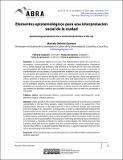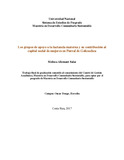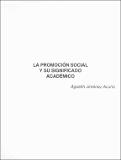| dc.contributor.author | Otárola-Guevara, Marcela | |
| dc.date.accessioned | 2020-08-18T21:10:37Z | |
| dc.date.available | 2020-08-18T21:10:37Z | |
| dc.date.issued | 2017-12 | |
| dc.identifier.issn | 2215-2997 | |
| dc.identifier.other | https://www.revistas.una.ac.cr/index.php/abra/article/view/9844/11883 | |
| dc.identifier.uri | http://hdl.handle.net/11056/17913 | |
| dc.description.abstract | El crecimiento urbano en la Gran Área Metropolitana (GAM) de Costa Rica se
incrementó, sustancialmente, en las últimas tres décadas, manifestándose claramente
en su forma espacial. Sin embargo, esta permuta es la expresión de otra más profunda:
una procedente del cambio en su forma social; por eso, para comprender e interpretar la
transformación en este ámbito, es preponderante establecer una posición epistemológica.
Así, partiendo del supuesto de la ciudad como una construcción social, en este escrito se
exponen los criterios teóricos de algunos científicos cuyos aportes, desde una perspectiva
crítica, permiten el análisis de la urbe como una red y una representación. El objetivo del
acopio y la concatenación de tales abonos es formular un itinerario teórico con el cual elucidar
en los poblados urbanos, los procesos velados que los transfiguran y que presentan una
dualidad: son causados por la acción humana y su efecto recae en ella; dialéctica constante
que amerita un abordaje cognitivo que considere la ciudad como un ente vivo, en tensión e
inacabado. | es_ES |
| dc.description.abstract | Urban growth in the Greater Metropolitan Area (GAM) of Costa Rica has increased
substantially in the last three decades, clearly manifesting itself in its spatial form. This
transformation, however, is the expression of a more profound change: one stemming
from the change in its social form. Consequently, in order to understand and interpret the
transformation in this area it is important to use an epistemological approach. Based on the
assumption that the city is a social construction, this paper includes the theoretical criteria of
scientists whose contributions, from a critical perspective, allow the analysis of the city both
as a network and a representation. The purpose of collecting and linking those contributions
is to formulate a theoretical itinerary to clarify, in urban villages, the veiled processes that
transform them and present a duality: they are caused by human action and human action
receives their effects, a constant dialectic that deserves a cognitive approach that sees the
city as an unfinished living entity in tension | es_ES |
| dc.description.sponsorship | Universidad Nacional, Costa Rica | es_ES |
| dc.language.iso | spa | es_ES |
| dc.publisher | Editorial de la Universidad Nacional | es_ES |
| dc.rights | Acceso abierto | es_ES |
| dc.rights.uri | http://creativecommons.org/licenses/by-nc-sa/4.0/ | * |
| dc.source | Revista ABRA Vol. 37, No. 55 | es_ES |
| dc.subject | EPISTEMOLOGÍA URBANA | es_ES |
| dc.subject | CONSTRUCTIVISMO SOCIAL | es_ES |
| dc.subject | REPRESENTACIÓN SOCIAL | es_ES |
| dc.subject | DIALÉCTICA URBANA | es_ES |
| dc.subject | ENFOQUE SISTÉMICO | es_ES |
| dc.subject | URBAN EPISTEMOLOGY | es_ES |
| dc.subject | SOCIAL CONSTRUCTIVISM | es_ES |
| dc.subject | SOCIAL REPRESENTATION | es_ES |
| dc.subject | URBAN DIALECTIC | es_ES |
| dc.subject | SYSTEMIC APPROACH | es_ES |
| dc.title | Elementos epistemológicos para una interpretación social de la ciudad. | es_ES |
| dc.title.alternative | Epistemological elements for a social interpretation of the city | es_ES |
| dc.type | http://purl.org/coar/resource_type/c_6501 | es_ES |
| dc.description.procedence | Escuela de Historia | es_ES |
| dc.identifier.doi | http://dx.doi.org/10.15359/abra.37-55.5 | |




